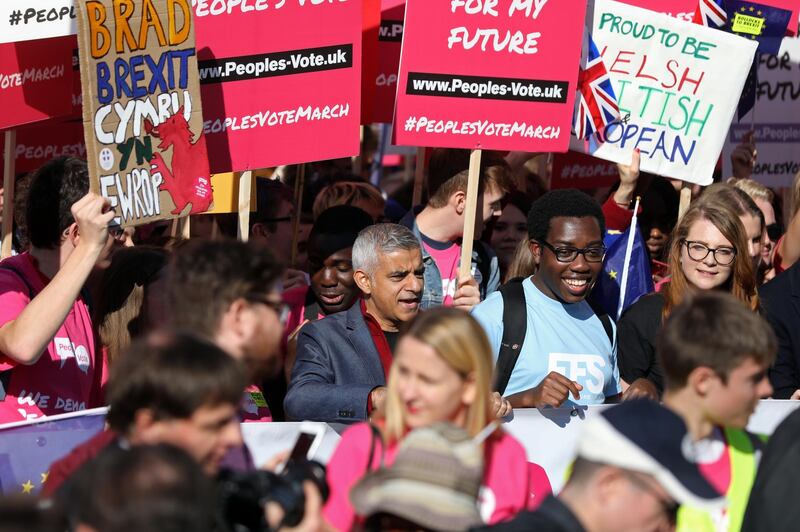They came from as far away as Orkney, off the north coast of Scotland. They came from Wales and Cornwall and from all over England. At one point I found myself marching next to a group of Welsh language speakers; behind me walked a woman with a placard reading “Fromage Not Farage” – Nigel Farage being one of the politicians who threw his weight behind the Brexit vote to pull Britain out of the European Union.
Many other placards were rather rude, in a gentle British kind of way. For an enormous crowd of 700,000 people, everyone was jolly and polite in the autumn sunshine. And yet the People’s Vote march last weekend demanding a referendum on the final terms of any Brexit deal turned out to be the biggest outpouring of political anger in London since the 2003 marches against the Iraq war.
And that – for some people – is the catch. What is the point of protesting against Brexit in 2018 when Tony Blair’s government did not listen to protesters on the Iraq war 15 years ago? Why should Prime Minister Theresa May listen to demonstrators now?
The most obvious reason is raw politics. Mr Blair won three election victories by a landslide. In 2003, he led a largely united government behind the Iraq war. But Mrs May is living on borrowed time. Sections of her own party cannot wait to get rid of her. She unwisely forced Britain into a general election in 2017 and lost seats, credibility and any clear mandate to negotiate Brexit. Her Conservative government is propped up by unreliable allies from Northern Ireland's Democratic Unionist Party.
_______________________
Read more from Gavin Esler:
[ Why I joined the People's Vote campaign ]
[ In a crunch week for Brexit, there are echoes of the crash and burn of the DeLorean dream ]
[ Politicians could learn a lesson from ancient Rome and know when to quit ]
_______________________
The second reason why a rethink on Brexit is possible came last week in Brussels. I spent the week in the corridors of the EU talking to members of the European Parliament and officials in the European Commission. One Irish MEP, hearing Mrs May pleading for more time, turned to me and said: “More time for what? More time to waste?” The British government, he added, had spent two years arguing among its own ranks. Another MEP said the British keep coming to Brussels demanding “our help to deliver Brexit” – without being clear about what Brexit is supposed to be.
The British traditionally have a reputation for being difficult at European summits but are always well-prepared and well-briefed. Former prime minister Margaret Thatcher was respected by the EU, even if she was not liked. But Mrs May, I was told repeatedly, is blundering around. "She has such a difficult hand to play," was how one MEP put it. Drawing pity is not, on the whole, a successful negotiating technique.
One further political fact helped propel me and 700,000 others onto London's streets at the weekend – the lack of coherent opposition to Mrs May. Traditionally you might expect the British Labour Party to sense the new public mood on Brexit and lead the charge against Mrs May’s government.
But Labour Party leader Jeremy Corbyn announced on the day of the march that he would instead be in Geneva to meet Michelle Bachelet, the former president of Chile and current United Nations High Commissioner for Human Rights. I have interviewed Ms Bachelet and she speaks eloquently about the death of her father, a doctor, during the military coup in Chile. Mr Corbyn cares deeply about Latin America. But the Chilean coup was in 1973. Meeting Ms Bachelet to discuss human rights and reminisce about the 1970s while hundreds of thousands are demonstrating in Britain in 2018 is nostalgia, not pressing politics.
The truth is that Mr Corbyn's Labour Party is as divided as Mrs May's Conservatives. Both leaders are constantly undermined from within.
The result is a massive leadership vacuum at the summit of British politics. Millions of British people think no political party truly represents their interests. Those attending the People’s Vote rally included the Labour mayor of London, Sadiq Khan, numerous backbench Labour and Conservative MPs and other party representatives.
But the biggest demonstration in London for 15 years shows that it is the people who are leading the leaders and it’s not clear how the British government or opposition will settle their internal feuds. What is clear is that massive public discontent is growing about the supposed “inevitability” of Brexit.
The atmosphere is so febrile that over the next few weeks, we could have a new prime minister, a general election or even a prolonged stalemate because no faction feels strong enough to push hard for a new kind of leadership. The uncertainty is bad for British business.
That’s why marching last Saturday felt like a big political moment, when people from all parties and backgrounds, from Scottish and Welsh nationalists to activists in Northern Ireland who held their own demonstration in Belfast, to Londoners and those who travelled up from the far corners of England, all had something to say.
And there is one further reason the march might change politics. For many British people, Mr Blair’s reputation has been forever blighted by that unpopular 2003 war. If Mrs May forces through a Brexit deal without the endorsement of the public, the reputation of the Conservative party as the party of business, pragmatism and careful moderate change might disappear for a generation.
Gavin Esler is a journalist, author and television presenter






